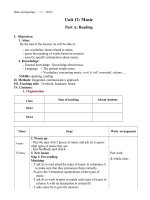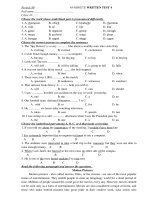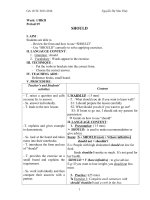GIÁO ÁN TIẾNG ANH LỚP 10 bamsat 10 2 va 3
Bạn đang xem bản rút gọn của tài liệu. Xem và tải ngay bản đầy đủ của tài liệu tại đây (97.95 KB, 4 trang )
Self-chosen - English 10
Date:…../…………/……….
Period: 2
THE SIMPLE PRESENT TENSE
I. AIM :
Students are able to
- Master the use of the simple present tense.
- Use this tense correctly to solve communicative tasks.
II. LANGAUGE CONTENT :
1. Grammar : The simple present tense
2. Vocabulary : words appear in the exercise.
III. PROCEDURE :
Teacher’s and Students’ activities
Content
I. WARM UP :
- T. has Ss. tell the class about their
Suggested ideas:
daily activities.
Now, I will tell you about my daily activities. I often get up at 6
- T. calls on some Ss. to speak out in o’clock. Then, I have breakfast at 6.30. After that, I
front of the class.
………………………………….
- T. gives comments.
II. LANGUAGE CONTENT :
1. Presentation:
THE SIMPLE PRESENT:
Form : P : S + V (-s/-es) + ………
- T. reminds Ss. of the form and the
N : S + don’t/ doesn’t + V (bare inf.) + …..
use of this tense.
Q : Do/ Does + S + V (bare inf.) + …….?
To be :
I + am = I’m
He/she/ it / singular nouns + is = he’s /she’s / it’s…
You/ we/ they/ plural nouns + are = you’re/we’re/ they’re…
To have : I/ we/ you/ they + have
He/ she/ it + has
Spelling:
- T. also retells the class the ways of
+ Add -s to most verbs
pronouncing the ending -s in the
+ Add -es to verbs ending in -o (do/does), -s (misses), -x (mixes),
simple present tense.
-ch/-sh (catches/ pushes)
Pronunciation:
+ We pronounce -s as /s/ after these sounds : /f/ (laughs), /p/
(drops), /k/ (kicks), /t/ (lets)
- T. gives examples and explains them
+ We pronounce -s as /iz/ after these sounds : /z/ (loses), /s/
to help Ss. make clear.
(passes), /∫/ (pushes), /dʒ/ (manages), /t∫/ (watches), and /ks/ (mixes)
+ We pronounce -s as /z/ after all other sounds and after
vowels (sees)
Use: The Present Simple tense describes :
- a habit or a repeated action.
- something always true.
- Ss. listen to T.’s explanation, observe
Teacher : Nguyeãn Thò Thu Thuû y
Self-chosen - English 10
at the board while taking notes into
their notebooks.
-
scheduled events in the near future.
a state in the present.
Signals :
- every day/ week/ month…,
- often, usually, always, sometimes, normally, seldom, as a
rule… (stand after “to be” and before main verb of the sentence)
2. Practice:
Exercise 1 : Give the third person forms of the verbs in
these sentences, and show whether you would pronounce the third
person form as /s/, /iz/ or /z/
Answers :
1. They laugh a lot. He laughs
/s /
1. He laughs … / s /
2. I often drop things . She……………./ /
2. She drops … /s /
3. We drink a lot of tea. She…………./ /
3. She drinks … /s /
4. I often forget things. She………./ /
4. She forgets … /s /
5. We often lose things. He…………./ /
5. He loses … /iz /
6. They manage all right. He………./ /
6. He manages … /iz /
7. I often pass your house. He………/ /
7. He passes … /iz /
8. I rush around a lot. She………../ /
8. She rushes … /iz /
9. I wear old clothes at home. He…/ /
9. He wears … /z/
10. I cry at sad movie. She…………../ /
10. She cries … /z /
- T. shows a mini board to provide Ss.
the exercise.
- T. explains the exercise and guides
Ss. to do it.
T. models with one sentence first.
- Ss. work individually and then
compare their answers with a partner.
- T. goes around the class and offers
help.
- After some minutes, T. asks some
Ss. to go to the board and write down
their answers.
- T. checks and corrects with the whole
Exercise 2: Put the verbs into the correct tense.
class.
1. Water (boil)…………………..at 100 degrees centigrade.
2. George (not/go)…………………. to the cinema very often.
- T. provides the task on a mini board
3. The swimming bath (open)………………………at 9.00 and (close)
and has Ss. copy into their notebooks.
………………….at 18.30 every day.
- T. explains the requirement of the
4. What time (the banks/ close) ………………………… in Britain?
task.
5. Where (your father / come)…………………………from? - he (come)
- Then, T. has Ss. work individually to
……………………………Scotland.
do the exercise.
6. How many languages (you / speak)………………..?
- T. goes around the class the check
7. I have a car but I (not / use)…………………..it very often.
and provide help if necessary.
8. I (play)………………..the piano, but I (not / play) ……very well.
- After some minutes, T calls on some
Ss. to write their answers on the board. Answers :
1. boils
5. does your father come….? – comes
2. doesn’t go
6. ...do you speak…?
- T. has other Ss. give comment and
3. opens – closes
7.don’t use
suggest correction if the sentences are
4. …do the banks close…? 8. play – don’t play
wrong.
III. Homework :
Ss. review the simple present tense, the pronunciation of ending
-s/-es and do exercise in workbook – English 10
Self-evaluation :
Date:…../…………/……….
Teacher : Nguyeãn Thò Thu Thuû y
Self-chosen - English 10
Period: 3
THE SIMPLE PAST TENSE
I. AIM :
Students are able to
- Master the use of the simple past tense.
- Use this tense correctly to solve communicative tasks.
II. LANGAUGE CONTENT :
1. Grammar : The simple past tense.
2. Vocabulary : Words appear in the exercise.
III. PROCEDURE :
Teacher’s and Students’ activities
Content
I. WARM UP :
- T. has Ss. tell the class about their T. : What did you do in the Independence Day holiday?
last holiday by asking Ss. some
Where did you go?
questions
Suggested ideas:
- T. calls on some Ss. to speak out in Last Independence Day holiday, I went to Long An with my
front of the class.
friend. We visited his grandparents there. I enjoyed this holiday
- T. gives comments.
very much. The weather was nice and the people there were
interesting. I had a chance to……………..
- T. reminds Ss. of the form and the
use of this tense.
- T. also retells the class the ways of
pronouncing the ending -ed in the
simple past tense.
- T. gives examples and explains them
to help Ss. make clear.
- Ss. listen to T.’s explanation, observe
at the board while taking notes into
their notebooks.
II. LANGUAGE CONTENT :
1. Presentation:
THE SIMPLE PAST TENSE:
Form : P : S + V(-ed/V2) +…
N : S + didn’t + V (bare inf) + …
Q : Did + S + V (bare inf) + … ?
To be :
I/ He/She/ It / singular nouns + was
You/ We/ They/ plural nouns + were
Spelling:
+ Add -ed to most of the verbs in the past simple form.
+ Many irregular verbs do not end with -ed, and we use the past
form (V2)
Pronunciation:
+ We pronounce -ed as /id/ after these sounds : /d/ (needed),
and /t/ (wanted).
+ We pronounce -ed as /t/ after these sounds : /k/ (packed), /s/
(passed), /∫/ (pushed), /f/ (laughed), /t∫/ (watched), and /p/ (stopped)
+ We pronounce -ed as /d/ after all other sounds and after
vowels (played)
Use: The Past Simple tense describes :
- an activity that began and finished at a certain point of time
in the past
Teacher : Nguyeãn Thò Thu Thuû y
Self-chosen - English 10
-
- T. shows a mini board to provide Ss.
the exercise.
- T. explains the exercise and guides
Ss. to do it.
T. models with one sentence first.
- Ss. work individually and then
compare their answers with a partner.
- T. goes around the class and offers
help.
- After some minutes, T. asks some
Ss. to go to the board and write down
their answers.
- T. checks and corrects with the whole
class.
- T. provides the task on a mini board
and has Ss. copy into their notebooks.
- T. explains the requirement of the
task.
- Then, T. has Ss. work individually to
do the exercise.
- T. goes around the class to check and
provide help if necessary.
- After some minutes, T calls on some
Ss. to write their answers on the board.
- T. has other Ss. give comment and
suggest correction if the sentences are
wrong.
a habit in the past.
a duration which starts and stops in the past
Signals : yesterday, last week/ month/ …, ago, this morning,
in……
2. Practice:
Exercise 1 : Give the past forms of the verb in brackets,
and then show whether you would pronounce those past forms
as /d/, /t /, or /id/.
1. We visited his uncle yesterday (visit) ……../id/.
2. Joan …………..her room on Friday (clean)……../ /
3. She ……………my letter yesterday (post)…………./ /
4. She………….when she saw me (stop)………../ /
5. He ………..a lot as a baby (cry)…………./ /
6. I …………..of you last night (dream)…………../ /
7. We………….into the house (hurry)………………/ /
8. I…………………early yesterday (finish)…………./ /
9. I………………the door before I left (clock)………/ /
10. It’s……………..in the bill (include)……………/ /
Answers :
1.visited ………./ id /
6. dreamed…………. /d /
2. cleaned ………./d /
7. dreamed…………. /d /
3. posted ………./id /
8. finished………. /t /
4. stopped…….… /t /
9. clocked……….. /t/
5. cried ………… /d /
10. included…………… /id /
Exercise 2: Put the verbs into the correct tense.
1. Tom ………………………… (not/ shave) this morning because
he…………………….. (not/ have) time. didn’t shave – didn’t have
2. We………………………(not/ eat) anything because we ……………………….(not/
be) hungry. didn’t eat – weren’t
3. Tom’s father ………………(teach) him how to drive when he was 17.
taught
4. Mr. Edward……………………(die) ten years ago. died
5. She……………………(not/ be) interested in the book because she
………………………..(not/ understand) it. wasn’t - didn’t understand
6. We………………(need) some money so we …………………. (sell) our car.
needed – sold
7. When…………….Mr Edward………..(die) ? did Mr. Edward die
8. What………………..you…………………(do) at the weekend? did you do
9. Why …………..you ………….(be) so angry? were you
10 .………..you………………(go) out last night, Tom? Did you go
III. Homework :
- Ss. review the simple past tense, the pronunciation of ending
-ed and some common irregular verbs
- Ss. do exercise in workbook – English 10
Teacher : Nguyeãn Thò Thu Thuû y









